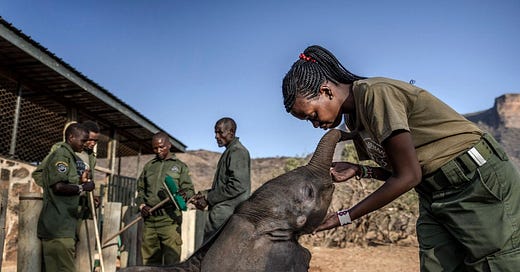The Top 5: Space Tourism + Millennials are getting old!
Plus, we'll have a big announcement tomorrow...
ICYMI, Wear We Are this past week

Welcome to your weekly edition of the Top 5 articles we’ve read this week. Each week, we read dozens of articles in the hope we find essays and reporting that speaks to big ideas, trends, future looks, and incredible human stories. We hope you enjoy our list, and do always let us know if you have a suggestion or a recommendation! Please also consider becoming a paid subscriber if this is one of those newsletters you open up all the time or look forward to each week.
The Top 5 articles for your week:
“Ada Limón Is a Poet Laureate for the 21st Century” (Smithsonian Magazine)
Because we love Ada Limón (her poem, The Year of the Goldfinches, hangs in our home) and she deserves to be named this year’s Poet Laureate.
“The Promise and Peril of Space Tourism” (AFAR)
Because “Whether the great undertaking of space travel for its metaphysical revelations can outweigh its material waste is a question of how to measure purpose. There are no hard statistics on the degree to which people who experience the Overview Effect become committed environmentalists, and it certainly isn’t clear whether a lifetime of environmental advocacy can compensate for the emissions of some spaceflights. That’s obviously not the point of missions operated by astronauts who are seeking to gather data and expand humanity’s understanding of the universe. But for many of the multiplying number of journeys to space that are tailored to transport a tourist, the meaning of these flights is measured in large part by personal and existential transformation.”
“Column: I once fell for the fantasy of uploading ourselves. It’s a destructive vision” (LA Times)
Because this author’s early 2000s experience of the internet is applicable to the revolution of social media today: “As a preteen, I’d never heard of the transhumanists, the longtermists or the Extropians. But their early members were pumping propaganda into the culture, including the possibility of escaping our human forms, which they depicted as “weak, vulnerable, stupid.” This perspective infected me at a time when I was frightened of my body — of its origins and its uncertain future.”
“Growing Old Online” (Wired)
Because for Millennials, “Questions of aging are questions of identity and purpose. This generation is the first to have to decide whether being extremely online is sustainable past youth, which perhaps gives us a chance to once again redefine our relationship to social media and the internet itself. We can believe the myth that says we created the internet and invented social media, but if we did that, then we are also capable of inventing a new thing, of dreaming up a new form of living, beyond internet youth culture and capitalist churn. We can mediate our relationship with the internet in a way that admits the inevitability of change and seeks out the mysteries and possibilities of this next coming-of-age. We can celebrate moving away from youth, rowing out into the enormous unknown ocean beyond it, and start to consider whatever kind of internet might exist out there.”
“Why Politics Has Become So Stressful” (The Atlantic)
Because “…so many voters—and so many states—are reliably locked down for one side or the other, even the slightest shifts among the few voters and few states that are truly up for grabs can tilt the balance of power. The consequence is a politics in which neither party can sustain a durable advantage over the other, and political direction for a country of 330 million people is decided by a tiny sliver of voters in about half a dozen states—maybe a few hundred thousand people in all. These twin forces largely explain why so many Americans now find politics so stressful.”



